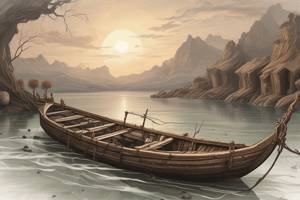Podcast
Questions and Answers
What is a characteristic feature of myths?
What is a characteristic feature of myths?
- They always contain concrete proofs.
- They exaggerate and are symbolic. (correct)
- They are strictly factual accounts of events.
- They are always written in prose.
Which description best fits a fable?
Which description best fits a fable?
- It features animal characters and teaches moral lessons. (correct)
- It is a lengthy description of gods and their actions.
- It is a surprising narrative that uses extensive dialogue.
- It has complex narratives with adult characters.
What distinguishes a short story from a novel?
What distinguishes a short story from a novel?
- A short story is typically written in prose and narrated once. (correct)
- A short story is narrated in verse.
- A short story contains multiple protagonists.
- A short story is usually longer than a novel.
In the context of novels, what is anagnorisis?
In the context of novels, what is anagnorisis?
Which of the following statements about narration is true?
Which of the following statements about narration is true?
Flashcards are hidden until you start studying
Study Notes
Myth
- Explains natural phenomena without proof.
- Uses symbolism to represent ideas about creation, gods, and the end of the world.
- Often exaggerates and includes fantastical elements.
- Based on real time and place, possibly originating from real events.
Narration
- Extensive and poetic.
- Focuses on stories about gods.
Fable
- Has a clear moral message and is brief.
- Features animal characters and often has a childish tone.
Short Story
- Written in prose.
- Contains dialogue and monologue.
- Often has a surprising ending.
Novel
- Written in prose.
- Explores complex topics and includes characters.
- Features a main character called the protagonist.
- The protagonist often encounters obstacles, including an anagnorisis (moment of recognition) that challenges their understanding.
- Contains supporting characters that are part of the story setting.
- Secondary and incidental characters appear briefly or in specific scenes.
Studying That Suits You
Use AI to generate personalized quizzes and flashcards to suit your learning preferences.




